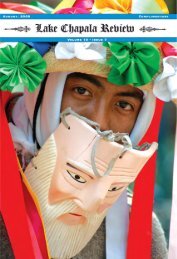Volume 10 - Issue 1, February 15, 2008 - Lake Chapala Review
Volume 10 - Issue 1, February 15, 2008 - Lake Chapala Review
Volume 10 - Issue 1, February 15, 2008 - Lake Chapala Review
Create successful ePaper yourself
Turn your PDF publications into a flip-book with our unique Google optimized e-Paper software.
Page 22 <strong>Lake</strong> <strong>Chapala</strong> <strong>Review</strong><br />
<strong>February</strong> <strong>2008</strong><br />
Sacred Texts – Chinese Religion and Philosophy<br />
The Tao Te Ching (Part 2)<br />
Dr. Ronald A. Barnett, BA, MA, MA, PhD lakechapalareview@yahoo.com<br />
In Part One we looked briefly at the Chinese classic the<br />
Tao Te Ching (“Classic of the Way and its Virtue,” hereafter<br />
abbreviated TTT). In this fundamental text of Taoism<br />
metaphysical, ethical, political, mystical, philosophical, and<br />
religious themes together form an integrated philosophy<br />
of life. This is in contrast to our technologically-driven<br />
future-oriented society in which we tend to categorize<br />
everything into separate compartments. The unique world<br />
outlook of Lao Tzu, author of the TTT, the difficulties of<br />
ancient Chinese , and the subsequent ambiguity of key<br />
terms make interpretation of this ancient text difficult.<br />
However, we can begin to probe the meaning of the TTT<br />
by examining a few of its key concepts, such as De (Virtue),<br />
Ziran (Naturalness), and Wu Wei (Non-action in Activity).<br />
In Taoism, De is the essence of Tao (the Way, a topic to<br />
which we shall return later), which is inherent in all beings.<br />
If one lives in accordance with Tao, then one naturally lives<br />
a virtuous life. But Lao Tzu was an individual thinker and so<br />
in some ways at odds with state-sponsored Confucianism<br />
which was concerned more with proper conduct and<br />
political ethics than with individual spiritual development.<br />
In Confucianism and extended usage moral virtue is indeed<br />
obtained from the Tao and is therefore a natural way of life<br />
and thought but it is more a matter of self-cultivation than<br />
an inherent feature of the Tao. This is an example of the<br />
ambiguity in many of the key terms and concepts of the<br />
TTT. The usual Latin-based translation of De as “virtue”<br />
gives the idea of strength and capacity, which rather misses<br />
the more subtle meaning of the term in Taoist philosophy.<br />
Ziran (Naturalness) from “self ” (zi) “so” (ran) is another<br />
key term. The power of Tao found in nature is also<br />
found in a way of life that is in accord with nature. This<br />
idea is graphically represented in Chinese landscape<br />
painting. One of my favorites, “Traveling among Streams<br />
and Mountains,” by Fan K’uan (early 11 th century), shows<br />
a caravan proceeding along a pathway at the foot of a<br />
beetling mountain. Half-hidden on one of the foothills the<br />
roof of a Buddhist monastery pokes its unobtrusive head<br />
just above the treeline. The human travelers below are<br />
almost indiscernible because they blend in completely with<br />
the surrounding landscape. In Taoist philosophical terms<br />
they are in accord with the Tao in not seeking to dominate<br />
nature as in western technological society. In Taoism as in<br />
ADOBE REAL ESTATE OFFERS<br />
HOUSE RENTALS<br />
Landlords or Renters Call:<br />
765 - 2671<br />
Cell: 045-331-<strong>15</strong>7-2022<br />
pauleastraza@hotmail.com<br />
Chinese paintings the human element appears as a integral<br />
part of nature.<br />
WU WEI, which might be interpreted as “Non-Action<br />
in Activity,” is a most important key concept. However,<br />
there are so many different translations and subtle<br />
interpretations of this term that it is best illustrated by<br />
examples. Basically Wu may be translated as “nothing,”<br />
“non-being,” “negativity,” etc., although it does not signify<br />
nothing or annihilation in the usual western sense of the<br />
word. This does not mean no-action but a kind of passivity<br />
in the midst of action. Do what is necessary but take no<br />
thought of success or failure.<br />
Let me illustrate the idea by posing the following<br />
question: why am I writing this article? Having been<br />
brought up and educated in western society, I might reply<br />
that I am writing this article to beat the competition and<br />
meet the deadline set by my editor. Secretly I might say<br />
to myself that I hope someone reads it and thinks what a<br />
clever fellow I am. This line of thought reflects some of<br />
the egotistical, ethnocentric, aggressive, dualistic, and<br />
competitive values my society has instilled in me.<br />
Now, let us suppose that I am writing this article in<br />
the spirit of WU-WEI. First it is not “I” who am writing<br />
this article; it is a person named Ronald A. Barnett who is<br />
writing it because that is what a person of this name does.<br />
The article may or may not get finished; but if it does it<br />
will likely get delivered to the editor’s office and possibly<br />
appear in the next issue of the magazine. People may or<br />
may not read it. Some may like it, others may hate it. But it<br />
doesn’t really matter because the writer is concerned more<br />
with the “thing-in-itself ” than with the final outcome. It is<br />
not the final product which matters so much as the process<br />
of reaching that point. Thus the outcome is not seen in<br />
absolute terms of black or white, as in ordinary western<br />
thinking. Think of “heads” and “tails” on a coin, where<br />
one side depends on the other. They are not opposites but<br />
rather complementary sides of the same coin. Likewise the<br />
ultimate “success” or “failure” of this article is relative.<br />
Provided that “I” (or the writer of this article) perform the<br />
task in the proper spirit of detachment then the result will<br />
be as it was meant to be. This is what is meant by taking no<br />
action in accordance with the principle of WU-WEI (Nonaction<br />
in activity); or, as we say, “go with the flow.”




